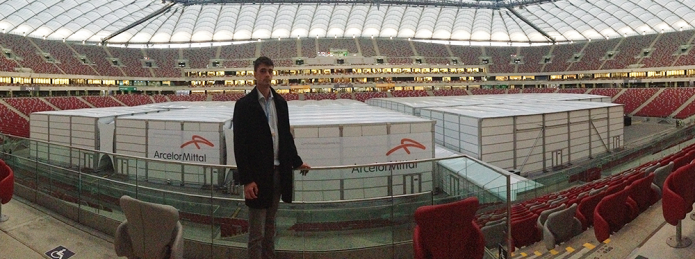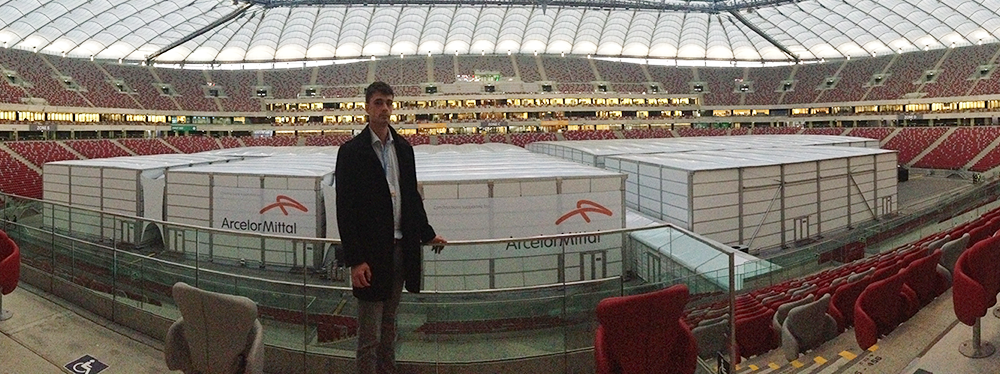
Robbie Watt in front of COP19’s plenary session boxes, sponsored by the corporation ArcelorMittal
We are half way through the 19th summit of the UN Framework Convention on Climate Change (UNFCCC) in cold, grey Poland. Far away in the Philippines thousands of people have lost their lives to Typhoon Haiyan and hundreds of thousands struggle to find food, water, and shelter.
This typhoon makes climate chaos dramatically visible as current reality—not just future possibility. The pictures and stories of the devastation are a reminder that as the planet warms, mega-storms like Haiyan are expected to become more frequent and more fierce. A typhoon hit the Philippines at the time of the COP last year too, as if devastating storms are becoming a ‘new normal’ at the climate negotiations.
The immediate and future impacts of climate change make the case for an urgent response – yet in Warsaw delegates seem to be responding with words instead of action.
As has been the case since the signing of the climate convention in 1992, a priority of international negotiations is for rich countries to agree and then act to cut their greenhouse gas emissions. Commitments are not really on the table here, but are supposed to be agreed by 2015, when the summit meets in Paris. Unfortunately governments are not showing much ambition, and are even outlining plans to do less than they had previously agreed to. Australia, Japan and Canada have been set a bad example to this effect, while the United States’ position as a laggard has hardly changed.
There are plenty of technical questions under discussion here in various work programmes and subsidiary bodies, keeping the delegates busy. But without any ambition on pollution cuts we are left with the clear impression of running around going nowhere, like a hamster racing round on the exercise wheel in its cage. With the meeting rooms arranged in a ring inside the circular national stadium, delegates are literally running around in circles at this negotiation.
Officials in Warsaw are already resigned to the idea that we must wait until 2015 before reaching a new global climate deal, and many countries—particularly developed ones—have accepted the notion that we’ll wait another five years after that before any of these plans are implemented. If that happens, the next 8 years will be filled with another ‘normal’ at these negotiations – all talk and no walk.
Only an emotional speech by Philippine head of delegation Naderev Sano about the lives and livelihoods lost in his home country and his pledge to fast until “a meaningful outcome was in sight” seemed capable of rousing the attention of both delegates and international media.
‘Green’ Corporate Sponsorship
Meanwhile, another ‘new normal’ is emerging at the climate summit. The negotiations in Poland have attracted an unprecedented number of corporate sponsors and lobbyists from big business and dirty industry, such as General Motors and the French energy conglomerate Alstom.
ArcelorMittal—one of Europe’s most polluting firms, with a track record of lobbying to make millions out of Europe’s failing experiments with carbon markets—constructed the temporary steel boxes in the national stadium (where the talks are taking place) to house plenary sessions, giving the impression that climate negotiations are literally being imprisoned under corporate control.
An entire floor in the stadium has been dedicated to private companies peddling ‘solutions’ to the climate crisis in the form of false-hope technologies such as pumping pollution underground and burning trash. Negotiators can relax in Emirates Air beanbag chairs, strategically placed all around the stadium. And many delegates carry complimentary goody-bags, a gift from the 11 official for-profit partners representing the aviation, auto, fossil fuel, and heavy industrial sectors.
The Polish government defends corporate sponsorship, claiming that the businesses involved provide ‘green’ products and services. In making this claim, the Poles are ignoring the compelling evidence of these firms’ environmental destruction and are legitimizing their dangerous presence at the negotiations, as outlined in the COP19 Guide to Corporate Lobbying.
Of course the private sector has to be part of solving the climate crisis—but first, they have to get out of the business of polluting for profit. We find the corporate capture of the climate conference problematic in three major ways.
First, the 11 corporate partners are enjoying privileged access in return for their support while civil society observer organizations—the groups that represent the public interest—have experienced unexpected restrictions in their ability to participate in the UNFCCC.
Second, many of the ‘solutions’ corporate partners offer are not ‘green’ and will not stop the release of greenhouse gases. Instead, these proposals serve to protect corporate interests while creating new opportunities for profit.
Third, climate change is a problem that can only be properly addressed through collective action. However, it’s becoming ‘normal’ to frame climate change as a business opportunity, where companies can make money from flawed carbon markets and the ‘Green Corporate Fund’.
COP19 is being branded as the first full-out corporate COP. This sets a dangerous precedent and should not become a ‘new normal.’ The apparent normality of disasters and lack of action associated with climate politics is already bad enough.
